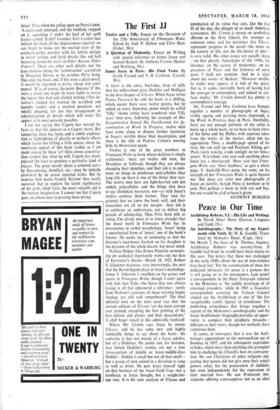The First JJ
Twelve and a Tilly. Essays on the Occasion of the 25th Anniversary of Finnegans Wake. Edited by Jack P. Dalton and Clive Hart. (Faber, 30s.)
A TILLY is the extra, buckshee, drop of milk that the milkwoman gives Dedalus and Mulligan
in the first chapter of Ulysses. When Joyce wrote Pomes Penyeach he sold the book at a shilling, which meant there were twelve poems, but he
added an extra, buckshee, poem which he call&I 'Tilly.' (Some critics have wondered who Tilly
was.) And now, following the example of Our Exagmination Round His Factification for ki- camina lion of Work in Progress, twelve men have come along to discuss further mysteries in Joyce's terrible dense final masterpiece, and there is the filly of Padraic Colum's moving little In Memoriam poem.
Twelve is one of the great numbers in Finnegans Wake (a book whose skeleton is simple
arithmetic): there are twelve old men, the Morphios or Sullivani, though they are always changing their identities, and their job is to com- ment on things in ponderous polysyllables (that long title up there is one of the things they say). The twelve men here are light-hearted and not unduly polysyllabic, and the things they have to say illuminate mysteries, not—as with Joyce's twelve—confuse them further. They take for granted that we know the book well, and their researches are all on the margin: their job is to celebrate an anniversary, not to deliver big parcels of scholarship. Thus Fritz Senn tells us
(what, I'm afraid, most of us knew already) that the insect motif in Finnegans Wake has its
provenance in verbal morphology, 'insect' being a metathetical form of 'incest,' one of the book's themes. He seems shy of reminding us that the dreamer's incestuous fixation on his daughter is the dynamo of the whole dream, but never mind. Nathan Halper (like Ernest Pontifex sermonis- ing on seedcake) ingeniously works out the date of Earwicker's dream—March 18, 1922. Robert F. Gleckner discusses, very interestingly, the part that the Byron-legend plays in Joyce's mythology.
James S. Atherton is excellent on the games and
sports in Finnegans Wake, though I can't agree with him that Tishy (the horse that was always
losing) is all that ephemeral a reference : surely Tom Webster's cartoons of those twisting hippic forelegs are still well remembered? The final editorial note on the texts used says that the
current editions of Ulysses 'are the most corrupt ever printed, excepting the first printing of the first edition and pirates and their descendants.' A chill finger raised at this admirable funferall. Where Mr. Cronin says Joyce he means Ulysses, and he has some new and highly•
ruminable things to say about the book : his authority is that not merely of a Joyce scholar, but of a Dubliner. He points out, for instance, that Simon Dedalus's cronies are not a true 'cross-section of middle or lower-middle-class
Dublin'—Dublin is small but not all that small— but a group of men united in a devotion to song as well as drink. He puts Joyce himself right on that business of the Ascot Gold Cup—not a handicap, as Joyce thought, but a weight-for- age race. It is his sane analysis of Ulysses and summation of its value that cuts, like the first JJ of the day; the phlegm a so much .American earnestness. Mr. Cronin is strong' on symbolism (Bloom as the Holy Ghost), but stronger on common sense, and his insistence that U/ys.ses represents progress in the novel—the stress on the texture of life, not the life-denial of plot-- is very valid. His other essays are equally sharp —on that ghastly Apocalypse of the 1940s, for instance; on the nature of modernity; on the greatness of Yeats and the littleness of some poets I shall not mention. And he is right about the works- of Beckett : 'However terrible its truths may appear, it is full of the gaiety that is. it seems, inevitably born of having had the courage to. contemplate, and indeed to out- face, reality.' Mr. Cronin himself has plenty of contemplative courage.
Dr. Freund and Miss Carleton have brought together a number of photographs of Joyce, visibly ageing and growing more depressed, in the Work in Progress days in Paris. Inevitably, there are not enough portraits of the artist to make up a whole book, so we have to have views of the Seine and the Halles, with captions taken from the works of the master, often not too appropriate. Thus, a double-page spread of the river, the sun well up and Parisians fishing, gets 'Paris rawly waking, crude sunlight on her lemon streets.' Everybody who ever said anything about Joyce has a photograph. Shaw said that Fitine- gans Wake was 'sheer madness,' so gets a whole page; V. Sackville-West earns the same, on the strength of her 'Finnegans Wake is quite beyond me.' But there are some new photographs of Joyce en famille, though Nora is nowhere to be seen. Not perhaps a book to rush out and buy, but one would be glad to have it given.
ANTHONY BURGESS


































 Previous page
Previous page